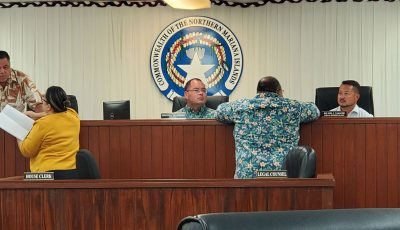The rule of succession
Section 7, Article lll of the CNMI Constitution is very specific and without a doubt provides that the vacancy of the office or position of governor shall be filled only by election, special or otherwise, when more than one year remains of the term.
I do wish that this effort of explaining what I thought is the intention of the framers of the CNMI Constitution would be viewed as neither favoring nor disfavoring any particular person, and am only stating a thought based on my understanding of the matter. I have great respect and admiration to the offices of the Governor and Lt. Governor and persons now holding these offices. I do not mean to cause any harm other than an interest to draw attention and engage conversation, as the case may be.
Section 7 makes a clear distinction of what we are dealing with here in that the Office of Governor is the “position” and the “person” is the entity elected to fill the office. This is very important to ascertain because of the succession of office that follows in case of removal, death or resignation of the person of this position or office. In addition, it is important recognizing that the condition for assumption of office to the position of governor ensues by “acting” appointment as stated in Section 8, subsections (a) and (b) of Article lll. Thus, the temporary absence of our late governor prior to his passing was effectuated as stated in Section 8 for the succession of persons by “acting” appointment(s).
Reading the first sentence of Section 7, the plausible intent of the framers of the CNMI Constitution must follow and take into account the rest of the meaning of sentences following. It appears that the framers of the CNMI Constitution posits that succession of person(s) to office(s), either the Governor or Lt. Governor, or both, would follow a chain of appointments limited only to specific offices in the chain of command as provided in this section. The offices and persons listed as successor by acting appointments are: the person and the office of the Speaker of the House, the person and the office of the President of the Senate, and the person and the office of the Lt. Governor. Why the offices up the chain of command is filled by “acting” appointment? It is because of what the framers of the CNMI Constitution posits in the last sentence of Section 7: “An acting governor or lieutenant governor who assumes office when more than one year remains in the term may serve only until a governor or lieutenant governor is chosen in a special election provided by law.” Acting governor or lieutenant governor as referred here is the person holding the office. Hence, the person holding the lieutenant governor position could hold the vacant position of governor because it is chosen only by election, special or otherwise. Hence, no person may hold the office or position of governor without election. The “government of governance” and “governance of government” are secured under “acting” appointment only, and where holding election is deemed not practical and where the term of office is less than a year remaining.
The terms removal, death, or resignation as stated in the first sentence of Section 7 only refers to the Office of the Governor and the person elected to this position. Nowhere is it written in this sentence concerning the person holding the office of the lieutenant governor where it is the subject of removal, resignation, or death. This important and critical to note, because the last sentence of Section 7 refers to acting governor or lieutenant governor, and suggests that the acting governor or lieutenant governor refers to the same person. Granted that the passing of our late governor would trigger a chain reaction of the succession of office and person, this can only be achieved constitutionally by “acting” appointment until the office of governor is chosen by election. Precedent has been realized in similarly situated prior incidents as the situation now, but in the present situation the likely interpretation must by driven and derived from given facts of the present issue. All business of governing are fully functional except the placement of the person to the governor’s office, and that can only be constitutional by popular election of the electorate.
Francisco R. Agulto
Kannat Tabla, Saipan



























